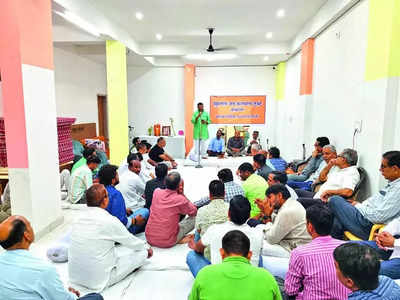JAIPUR: Diwali in Rajasthan’s desert city of Bikaner is a spectacle of light illuminated by an epic tradition of heralding the festival with a recital of the Urdu Ramayan, a Muslim professor’s labour of love and scholarship dating back to 1935.
Over the past 12 years, this event centred on Maulvi Badshah Shah Hussain Rana Lakhnavi’s presentation of the story of Lord Ram in Urdu has become an indispensable part of Bikaner’s annual celebration of the triumph of good over evil in more ways than one. Urdu Ramayan, seen as a testament to the spirit of Ram’s legend transcending faith, was born out of a nationwide competition organised by Banaras Hindu University (BHU) 89 years ago to commemorate Tulsidas Jayanti.
Rana Lakhnavi, a professor of Urdu in Bikaner at the time, participated in the competition and won a gold medal from the university. The erstwhile Maharaja Ganga Singh arranged a ceremony at Nagari Bhandar to listen to Rana Lakhnavi’s version. Urdu litterateur Sir Tej Bahadur Sapru presented gold medal to him on BHU’s behalf at the same event.
Rana Lakhnavi used to be an employee of the royal family of Bikaner between 1913 and 1919, during which time he was entrusted with the responsibility of translating orders issued by the Mughal rulers from Persian to Urdu.
The erstwhile ruler of Bikaner, Ganga Singh, later appointed him as an Urdu teacher at Dungar College. He also wrote poetry and continued to be involved in literary activities until his death in 1943 in his native village of Sandli near Lucknow.
Dr Zia-Ul-Hasan Qadri, an Urdu teacher and organiser of the Bikaner event, said Rana Lakhnavi’s Urdu Ramayan was the only available complete version of the epic in Urdu. Its beauty lies in the couplets that vividly describe scenes from Ramayan, including the battle against Ravan.
At this year’s recitation days before Diwali, Qadri recited couplets from Rana Lakhnavi’s translation that captivated the audience.
“Thode din mein jang ke bhi saaz o saman ho gaye, khoon se rangeen biyaban ho gaye/Ye bhi kuch zakhmi ho gaye, kuch woh bhi zakhmi ho gaye, katl-e-Ravan ke sab aasaar numayan ho gaye,” reads one of the couplets.
Bikaner Paryatan Lekhak Sangh’s “Mehfil-e-Adab” is as much a call for amity as it is a homage to the legend of Ram and Rana Lakhnavi’s craft.
Mukul Chaturvedi, a professor at Delhi’s Zakir Hussain College, has reproduced the text of Rana Lakhnavi’s book in English. It was published in Sahitya Akademi’s bimonthly journal in March-April 2022.
